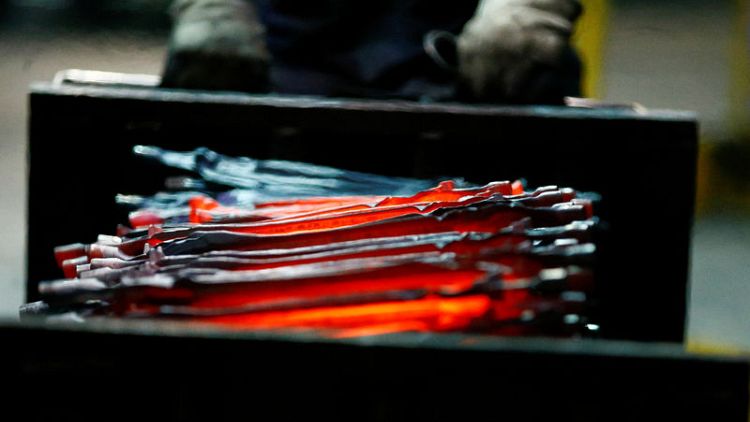By Michelle Martin
BERLIN (Reuters) - German industrial orders fell far more than expected in May, and the Economy Ministry warned on Friday that this sector of Europe's largest economy was likely to remain weak in the coming months.
Contracts for 'Made in Germany' goods were down by 2.2% on the month after rising slightly in March and April, data from the Economy Ministry showed. The reading undershot the Reuters consensus forecast for a 0.1% decline.
"The great order book deflation continues," ING economist Carsten Brzeski said. Devastating new orders data just undermined any hopes for an industrial rebound."
Other recent data have painted a gloomy picture of the sector too, with engineering orders falling and activity in the manufacturing sector contracting.
In a sign that the economic slowdown is beginning to bite, a survey by the Ifo institute published on Thursday showed German manufacturers expect to make more use of "Kurzarbeit" -- a short-hours facility aimed at avoiding mass lay-offs.
"What misery!" VP Bank economist Thomas Gitzel said after the orders data was published. "Given the significant decline in incoming orders, industrial production will remain extremely weak in the second half of the year and that increases the risk of recession for the German economy."
A breakdown of data showed foreign contracts dropping by 4.3%, driven by a strong decline in demand from non-euro zone countries.
The DIHK Chambers of Industry and Commerce this week more than halved its forecast for export growth this year, to 1%, and the VDMA engineering body said retaliatory tariffs on imported goods imposed by the United States and China would contribute to a 2% decline in production this year.
Trade conflicts, Britain's expected departure from the EU and a cooling global economic outlook are causing headaches for Germany, which for many years relied on exports for growth but has come to depend increasingly on private consumption.
Now its 10th year of expansion, the German economy returned to growth between January and March, posting a 0.4% expansion, but the Bundesbank expects a small contraction in the second quarter.
(Reporting by Michelle Martin; Editing by Catherine Evans)



